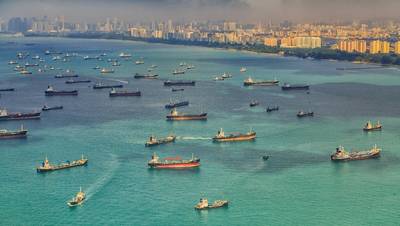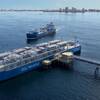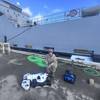Singapore Highlights its Maritime Achievements for 2023
The Singapore government has recounted the achievements of Maritime Singapore to date to highlight the nation’s successes as a maritime hub in 2023:
Total business spending by key maritime companies overseen by MPA exceeded S$4.8 billion, up from S$4.3 billion in 2022. Twenty-five maritime companies established or expanded their operations in Singapore last year. These included maritime services companies and companies setting up sustainability desks in Singapore as part of their decarbonisation strategy and growth plans.
The annual vessel arrival tonnage in the Port of Singapore crossed 3 billion GT for the first time, increasing by 9.4% over 2022 and setting a high of 3.09 billion GT in 2023. This reflects growth in all segments, including container ships, dry bulk carriers, liquid bulk and chemical tankers, ferries and specialised vessels, amidst a global trade slowdown.
Singapore’s container throughput in 2023 grew by 4.6% reaching a new high of 39.01 million TEUs, compared to the previous record of 7.57 million TEUs in 2021.
The Singapore Registry of Ships, among the world’s largest ship registries with one of the youngest quality fleets, surpassed 100 million GT in January 2024.
The Maritime Cluster Fund (MCF) facilitates the growth of Singapore’s maritime industry by supporting the industry’s talent and business development efforts as well as its drive for productivity improvements. Currently, there are three pillars under the MCF – MCF-Manpower Development, MCF-Business Development and MCF Productivity. To help the maritime industry tap into new growth opportunities in the green economy, a fourth pillar, MCF – Sustainability has been created, to catalyse first-mover adoption of sustainable solutions in targeted new areas. Under this pillar, MPA will set aside $15 million till 2030 to co-fund 30% for non-SMEs, or 50% for SMEs, of qualifying adoption costs of pre-approved sustainability solutions, up to $30,000 per solution. Under MCF-Sustainability, MPA may also fund projects on new sustainability solutions or projects to encourage industry-wide adoption of sustainability solutions.
The Energy Efficiency Grant (EEG) was launched in 2022 to support businesses in their sustainability journey by co-funding investments in energy efficient equipment. As announced in Deputy Prime Minister Lawrence Wong’s Budget 2024 speech, the EEG will be extended to more sectors, including the maritime sector. The EEG will provide two tiers of support – a Base Tier to provide up to 70% co-funding support for pre-approved energy-efficient equipment up to a $30,000 cap; and an Advanced Tier to support companies that wish to make larger investments to drive greater energy efficiency. Support is capped at $350,000 per company across Base and Advanced Tiers, until March 2026. For the maritime sector, EEG will be applicable to energy efficient domestic port and harbour craft equipment.
Wong also announced in his Budget speech that from April 2024, the Enterprise Financing Scheme – Green will be extended, and its scope expanded to cover the adoption of green solutions.
• For eligible activities, the scheme will provide enhanced risk-share of 70% to support lending by participating financial institutions to local enterprises.
• For the maritime sector, harbour craft owners and operators may apply for loans through this scheme to facilitate the green transition of their fleets.
• MPA will continue to work with the industry to develop other mechanisms to support the green transition of its port and harbour craft.
Tuas Port development remains on track, and the port will be developed in four phases. When completed in the 2040s, Tuas Port will be one of the world’s largest fully automated terminals with a handling capacity of 65 million TEUs. In 2023, three more berths under Phase 1 were opened, increasing the total operational berths in Tuas Port to eight. Three more berths will be opened by the end of this year.
Reclamation works for Phase 2 are currently about 70% completed. They are expected to be completed in 2027. Planning for reclamation works for Phase 3 has commenced. MPA is partnering with the National Environment Agency to explore using treated landfill mixed materials from Semakau Landfill as an alternative to sand for the reclamation works for Phase 3. Reclamation works for Phase 3 are expected to be completed in the mid-2030s.
In November 2023, MPA launched the digital bunkering initiative, becoming the first port in the world to implement electronic bunker delivery notes. Licensed bunker suppliers, ship owners, operators and crew using the mobile and cloud solutions approved by MPA to complete and issue digital bunkering documents can save close to 40,000 man-days per year, reducing compliance costs and improving productivity of the bunkering sector. To date, four solution providers have been approved by MPA, and about 24% of the licensed bunker suppliers and barge operators in the Port of Singapore have embarked on digital bunkering operations.
To support companies in the early adoption of digital bunkering and manpower upskilling, MPA also collaborates with Enterprise Singapore and Workforce Singapore and the National Trades Union Congress to provide funding and training support.
MPA has developed a Just-In-time Planning and Coordination Platform (JIT platform) under Phase 2 of digitalPORT@SG™. The JIT Platform provides advanced and real-time information on vessel schedules in port, allowing vessels to maintain optimal voyage speeds, minimise idling time at anchorages and reducing ships’ turnaround time. Marine service providers can also use the JIT Platform to plan and optimise the deployment of port resources such as pilotage, towage, bunker tankers and suppliers more effectively.
Companies utilising the JIT Platform can enjoy cost savings or cost avoidance with shorter port stays and optimised voyage planning. Through voyage optimisation, vessels can also lower their fuel consumption and reduce overall carbon emissions, and catch-up on arrival delays into Singapore, including those due to route disruptions.
From 1 October 2023, vessels berthing at the terminals of PSA Singapore and Jurong Port for cargo operations can use the JIT platform. The JIT platform will be available to tankers berthing at the energy terminals and to all vessels calling at the anchorages by the third quarter 2024.
From 1 April 2024, MPA will waive the need for security deposit and banker’s guarantees for billing parties assessed to be of lower credit risk. About 80% of the over 1,000 MPA’s existing billing parties will benefit from this revised credit management policy. The policy is expected to improve the businesses’ cash flow, including SMEs by more than S$20 million yearly.
The revised credit management policy will help maritime businesses improve liquidity and help them manage rising business costs. MPA will conduct engagement sessions, partnering with the Singapore Shipping Association to reach out to the maritime community, so that the businesses could benefit. MPA will refund the security deposit and discharge the banker’s guarantee from April 2024.
To better align Singapore’s tax regime for shipping entities with common international practices, an alternative basis of tax where the qualifying income of qualifying shipping entities is taxed by reference to the net tonnage of their ships will be available from year of assessment 2024 under the following Maritime Sector Incentive (MSI) sub-schemes:
• MSI-Shipping Enterprise (Singapore Registry of Ship)
• MSI-Approved International Shipping Enterprise, and
• MSI-Maritime Leasing (Ship).
The existing tax treatment under the relevant MSI sub-schemes will continue to apply to MSI entities that are not under the alternative net tonnage basis of tax.
In September 2022, the Ministry of Transport announced the formation of the Alliance for Future Maritime Talent (AFMT) to equip the maritime workforce with new skills as the industry transforms and help Singapore stay competitive in the face of global competition for maritime talent.
Aligned with the AFMT, the Tripartite Advisory Panel (TAP) was set up in early 2023 to engage industry and union stakeholders to gather feedback and identify emerging and future skills and relevant competencies for the maritime industry.
The TAP has put forth recommendations to prepare, equip, and sustain the upskilling of the Maritime Singapore workforce across shore-based and seafaring jobs and the development of a hub for future skills to build the maritime workforce of the future.
To build a strong pipeline of skilled maritime workers, Singapore need to identify skills useful for both employers and employees and provide quality and flexible upskilling and reskilling opportunities for working adults. To this end, MPA and the Singapore Maritime Foundation (SMF) has established a Joint Office for Talent and Skills. The joint office will work closely with industry partners and local tertiary institutions to facilitate training and upskilling of maritime workers.
As vessels decarbonise and transition to using alternative fuels in the future, the maritime workforce needs to be equipped with skills relating to the safe handling and bunkering of new alternative fuels, including emergency response plans and mitigation measures. MPA will continue working with its tripartite partners to develop the infrastructure and facilities to train the maritime workforce to prepare for this transition.
Workforce Singapore’s Career Conversion Programme (CCP) for Sea Transport Professionals and Associates provides employers with salary support to support new hires and existing employees in taking up new job roles in Port Operations and Services, Shipping, and Maritime Services.
Since December 2023, the CCP for Sea Transport Professionals and Associates has been enhanced to allow 100% on-the-job training based on industry partners’ and employees’ feedback. This gives companies more flexibility to structure employees’ reskilling needs in accordance with their business operations training programs, and employees will be able to apply what they have learnt directly in their new roles. The refreshed CCP has also expanded to focus on industry jobs redesign and reskilling in maritime digitalisation, decarbonisation, and cybersecurity. Currently, there are two programme partners, namely, Singapore Shipping Association and Association of Singapore Marine & Offshore Energy Industries to assist participating employers in customising training programs for their employees. Since 2019, more than 340 individuals have benefited from the CCP for Sea Transport Professionals and Associates administered by Workforce Singapore.












